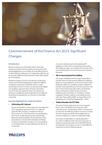Commencement of the Finance Act 2023: Significant Changes
Notable changes to the Act include the introduction of due date for Withholding Value Added Tax (WVAT) compliance, expansion of VATable items to cover removable structures or items not permanently affixed to a building, upward review of Tertiary Education Tax (TET) rate, the repeal of certain tax allowances relating to qualifying capital expenditure and deletion of existing tax exemptions on income in convertible currencies.
Key Highlights for Implementation
Withholding VAT Collected
As part of the effort to distinguish the tax obligation of an appointed agent from that of a collection agent for VAT purposes, a timeline of 14th of every month (i.e., 14th day of the month following the month of collection) has been specified for filing and remitting WVAT. The implication of this amendment is that the VAT withheld on VATable invoices received from vendors are no longer filed or remitted within 21 days following the month of transaction.
It is worth mentioning that the existing VAT obligation to file returns and remittance by every VAT collection agent on or before the 21st day of the month following the month of transaction remains the same.
VAT on Items Excluded from Building
The scope of VATable items has been expanded to include items not permanently affixed to buildings. Based on the amendment to Section 46 of the Value Added Tax (VAT) Act, building has been defined to exclude ‘’removable fixtures and structures from the land.’’ This includes items like radio and television masts, cell towers, mobile homes, and more. Following the amendment to ‘’building’’, entities engaged in letting, trading, or providing services with such items will be liable to charge VAT at the prevailing rate (7.5%) from September 1, 2023.
Tertiary Education Tax (TET) Rate
The rate of Tertiary Education Tax was increased from 2.5% to 3%. While the Finance Act 2023 commenced on 1st September 2023, it is important to note that the FIRS has stated in one of its circulars that the revised rate of 3% will be applicable on accounts ending on or after 1st September 2023.
Since year of assessment is usually adopted in tax, which is different from the accounting year or period, one would wonder when the FIRS intends to implement the revised tax rate on TaxProMax for corporate tax returns filing purposes.
Investment Allowances and Convertible Currencies
Sections 32, 34, and 37 of the Companies Income Tax Act (CITA) were deleted. Based on the amendment, tax allowances for qualifying capital expenditure (Plant and equipment), Rural Investment allowance, and tax exemptions on income in convertible currencies have been completely deleted and are no longer applicable for tax purposes from 1st September 2023.
Concluding remark
The Finance Act 2023 introduced significant changes to the tax landscape, with adjustments spanning across withholding VAT (WVAT), expansion of VAT coverage, modification of Tertiary Education Tax (TET) rate, and removal of specific allowances and exemptions. Taxpayers, tax practitioners, and the public are advised to promptly incorporate these changes into their tax activities to ensure compliance with the revised provisions of the enabling tax laws.
It is equally important to clarify to affected stakeholders that the VAT compliance obligation for an appointed agent is now distinct from that of a collection agent. While an appointed agent is required by law to file and remit VAT on the 14th of every month, a collection agent on the other hand still maintains the existing 21st day of every month.
On the implementation of the revised rate of tertiary education tax, we are of the opinion that the Service would engage further with the public, considering the dichotomy between year of assessment and accounting year in relation to the commencement date of 1st September 2023.
Should you require further guidance or clarification on the implications of these amendments, feel free to connect with any of our team members to navigate these changes effectively.

